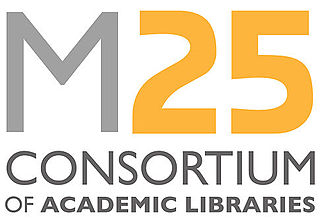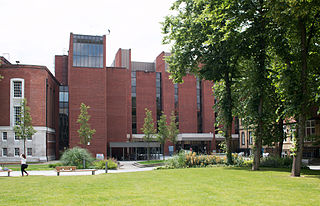Related Research Articles

A red brick university was originally one of the nine civic universities founded in the major industrial cities of England in the 19th century.

The Queen's University of Belfast, commonly known as Queen's University Belfast, is a public research university in Belfast, Northern Ireland, United Kingdom. The university received its charter in 1845 as "Queen's College, Belfast", and opened four years later.

The Russell Group is a self-selected association of twenty-four public research universities in the United Kingdom. The group is headquartered in Cambridge and was established in 1994 to represent its members' interests, principally to government and Parliament. It was incorporated in 2007. Its members are often perceived as being the UK's best universities, but this has been disputed.
The Officers' Training Corps (OTC), more fully called the University Officers' Training Corps (UOTC), are military leadership training units operated by the British Army. Their focus is to develop the leadership abilities of their members whilst giving them an opportunity to take part in military life whilst at university. OTCs also organise non-military outdoor pursuits such as hill walking and mountaineering. UOTC units are not deployable units nor are their cadets classed as trained soldiers until completion of MOD 1 training. The majority of members of the UOTC do not go on to serve in the regular or reserve forces.
A collegiate university is a university in which functions are divided between a central administration and a number of constituent colleges. Historically, the first collegiate university was the University of Paris and its first college was the Collège des Dix-Huit. The two principal forms are residential college universities, where the central university is responsible for teaching and colleges may deliver some teaching but are primarily residential communities, and federal universities where the central university has an administrative role and the colleges may be residential but are primarily teaching institutions. The larger colleges or campuses of federal universities, such as University College London and University of California, Berkeley, may be effectively universities in their own right and often have their own student unions.
Copac was a union catalogue which provided free access to the merged online catalogues of many major research libraries and specialist libraries in the United Kingdom and Ireland, plus the British Library, the National Library of Scotland and the National Library of Wales. It had over 40 million records from around 90 libraries as of 2019, representing a wide range of materials across all subject areas. Copac was freely available to all, and was widely used, with users mainly coming from Higher Education institutions in the United Kingdom, but also worldwide. Copac was valued by users as a research tool.

The M25 Consortium of Academic Libraries is a collaborative organisation that works to improve library and information services within the M25 region, and more widely across the East and Southeast of England.
Sir Peter Stanley Harper was a British physician and academic who was University Research Professor (Emeritus) in Human Genetics at Cardiff University. His work focused on researching neurogenetics and has resulted in discoveries concerning muscular dystrophies and Huntington's disease. He was knighted in 2004 for services to medicine.

Elizabeth Matilda Tansey is an Emerita Professor of the history of medicine and former neurochemist, best known for her role in the Wellcome Trust's witness seminars. She previously worked at Queen Mary University of London (QMUL).

The University of Manchester Library is the library system and information service of the University of Manchester. The main library is on the Oxford Road campus of the university, with its entrance on Burlington Street. There are also ten other library sites, eight spread out across the university's campus, plus The John Rylands Library on Deansgate and the Ahmed Iqbal Ullah Race Relations Resource Centre situated inside Manchester Central Library.
The History of Modern Biomedicine Research Group (HoMBRG) is an academic organisation specialising in recording and publishing the oral history of twentieth and twenty-first century biomedicine. It was established in 1990 as the Wellcome Trust's History of Twentieth Century Medicine Group, and reconstituted in October 2010 as part of the School of History at Queen Mary University of London.

Jessica Pearsall Gardner an English academic librarian. She has been the University librarian of the University of Cambridge in England since April 2017. She is the second woman in the history of the university to hold the position. She was formerly University Librarian at the University of Bristol., and prior to that Head of Library and Culture Services at the University of Exeter. She is a Fellow of Selwyn College. She received a doctorate in modern literary archives from the University of Leeds.

The armorial of British universities is the collection of coats of arms of universities in the United Kingdom. Modern arms of universities began appearing in England around the middle of the 15th century, with Oxford's being possibly the oldest university arms in the world, being adopted around the end of the 14th century. The earliest granting of university arms was to King's College Cambridge by Henry VI in 1449. Arms are granted by the College of Arms and Lyon Court. It has been suggested that new universities register arms is an attempt to appear more traditional or legitimate. As corporations, older university arms have historically been granted without a crest, however newer institutions use crests with mantling, including new colleges at older universities. The first crest granted to a university was to Leeds in 1905 while the first British university to be granted supporters was Sussex in 1962, although both Oxford and Cambridge have used angels as supporters and Cambridge has used the 'alma mater' emblem as a crest without these components being officially granted.
Janet Wilkinson is a British librarian and strategic leader in the HE and research sectors. She was the University Librarian and Director of the John Rylands University Library of the University of Manchester until 2018. She held the post for 10 years.

Keith Wilson is an artist, curator, educator, and cultural producer whose work spans sculpture, printmaking, participatory installation, and international exhibition making. Wilson received international notoriety in the late 1990s for his Puddle sculpture, and subsequently for Steles (Waterworks) sculptural installation, commissioned for the 2012 London Olympics, as well as for co-curating the exhibition Modern British Sculpture at the Royal Academy of Arts.
References
- ↑ "RLUK's Foundations in CURL". Research Libraries UK. Archived from the original on 14 November 2011.
- 1 2 "Members". Research Libraries UK. Retrieved 15 March 2023.
- 1 2 Fox, P. (2007). "CURL – Research Libraries in the British Isles". In Earnshaw R.; Vince J. (eds.). Digital Convergence – Libraries of the Future. Springer: London. pp. 75–82. doi:10.1007/978-1-84628-903-3_6. ISBN 978-1-84628-902-6.
- ↑ "RLUK (Research Libraries UK)". Companies House. Retrieved 27 July 2019.
- ↑ "CURL's Full Members". Consortium of University Research Libraries. 1 April 1997. Archived from the original on 25 January 1998.
- ↑ "Queen's University Belfast Becomes Newest Member of RLUK". RLUK Press Release. 13 June 2011. Archived from the original on 12 November 2013.
- ↑ "Library History". Durham University Library. Retrieved 27 July 2019.
- ↑ "Universities Of St Andrews And York Become Newest Members Of RLUK". RLUK News. 11 October 2011. Archived from the original on 11 December 2012.
- ↑ "University of Exeter becomes newest member of RLUK". University of Exeter. 12 September 2012. Retrieved 27 July 2019.
- ↑ "Queen Mary becomes newest member of RLUK". RLUK News. 7 February 2014.